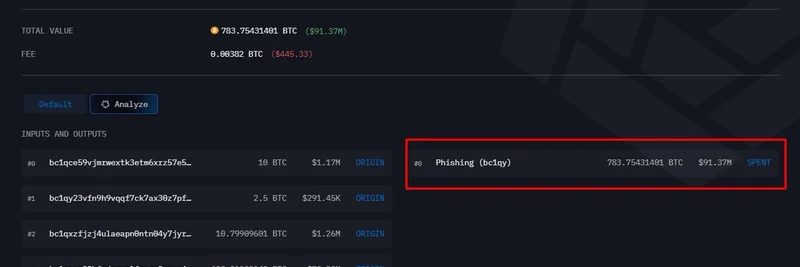The crypto world never sleeps, and neither do the scammers. A recent tweet from OnchainLens highlighted a jaw-dropping incident where a victim lost a staggering 783.75 BTC—worth about $91.4 million at the time—to a clever social engineering scam. This isn't just another hack; it's a stark reminder of how vulnerable even seasoned holders can be. Drawing from insights shared by blockchain investigator ZachXBT, let's break down what went down and what it means for everyone in the blockchain space, including meme token enthusiasts.
The Incident: A Costly Mistake on August 19, 2025
It all happened on August 19, 2025, when the victim fell prey to imposters posing as customer support from a crypto exchange and a hardware wallet provider. Social engineering, for those new to the term, is basically tricking people into giving up sensitive information through psychological manipulation rather than technical exploits. In this case, the scammers convinced the victim to hand over wallet credentials, leading to a massive drain of funds.
The transaction hash for this theft is da598f2a941ee3c249a3c11e5e171e186a08900012f6aad26e6d11b8e8816457, where the bulk of the BTC was sent to the hacker's address: bc1qyxyk4qgyrkx4rjwsuevug04wahdk6uf95mqlej. Shortly after, the funds started moving, with portions "peeled off" and deposited into Wasabi Wallet—a privacy-focused tool that mixes coins to obscure their origins. This makes tracking a nightmare, but it's a common tactic in big-time thefts.
Eerie Timing: One Year After the Genesis Creditor Hack
What's even more chilling? This scam struck exactly one year after the infamous $243 million Genesis creditor hack in August 2024. That earlier incident involved similar social engineering tactics, where attackers impersonated support to gain access to a creditor's funds. ZachXBT pointed out the coincidence, highlighting a worrying trend in the crypto ecosystem. In the first half of 2025 alone, hacks and scams have cost investors over $3.1 billion, according to reports. It's like the bad actors are getting bolder, and the stakes are higher than ever.
How These Scams Work and Why They're So Effective
Scammers often start with a phone call or message, claiming there's an issue with your account or wallet. They build trust by sounding professional and knowledgeable, then guide you through "fixing" the problem—which usually involves sharing seed phrases, private keys, or login details. Hardware wallets like Ledger or Trezor are supposed to be secure, but if you give away the keys, all bets are off.
In the meme token world, this hits close to home. Meme coins thrive on hype in Telegram groups, Discord servers, and X spaces, where fake support accounts lurk, ready to pounce on excited newbies. Remember, no legitimate support will ever ask for your private keys or seed phrases.
Key Lessons to Protect Your Crypto and Meme Tokens
So, how do you avoid becoming the next headline? Here are some straightforward tips:
Verify Everything: Always double-check the source. Use official websites or apps to contact support—never respond to unsolicited messages.
Use Hardware Wallets Wisely: Keep your seed phrase offline and never share it. Enable two-factor authentication (2FA) wherever possible, preferably with a hardware key.
Educate Yourself: Stay updated on common scams. Resources like ZachXBT's investigations or sites like CoinDesk offer great insights.
For Meme Token Holders: Be extra cautious with new projects. Rug pulls and phishing links are rampant in meme communities. Always DYOR (do your own research) and use tools like token scanners before diving in.
Multi-Sig Wallets: For large holdings, consider multi-signature setups that require multiple approvals for transactions.
By staying vigilant, you can enjoy the wild ride of meme tokens without the heartbreak of a drained wallet.
Incidents like this $91 million Bitcoin phishing scam underscore the need for constant awareness in the blockchain space. Whether you're hodling BTC or chasing the next viral meme coin, security should always come first. Follow experts like OnchainLens and ZachXBT for real-time updates, and remember: in crypto, trust but verify—every time.


